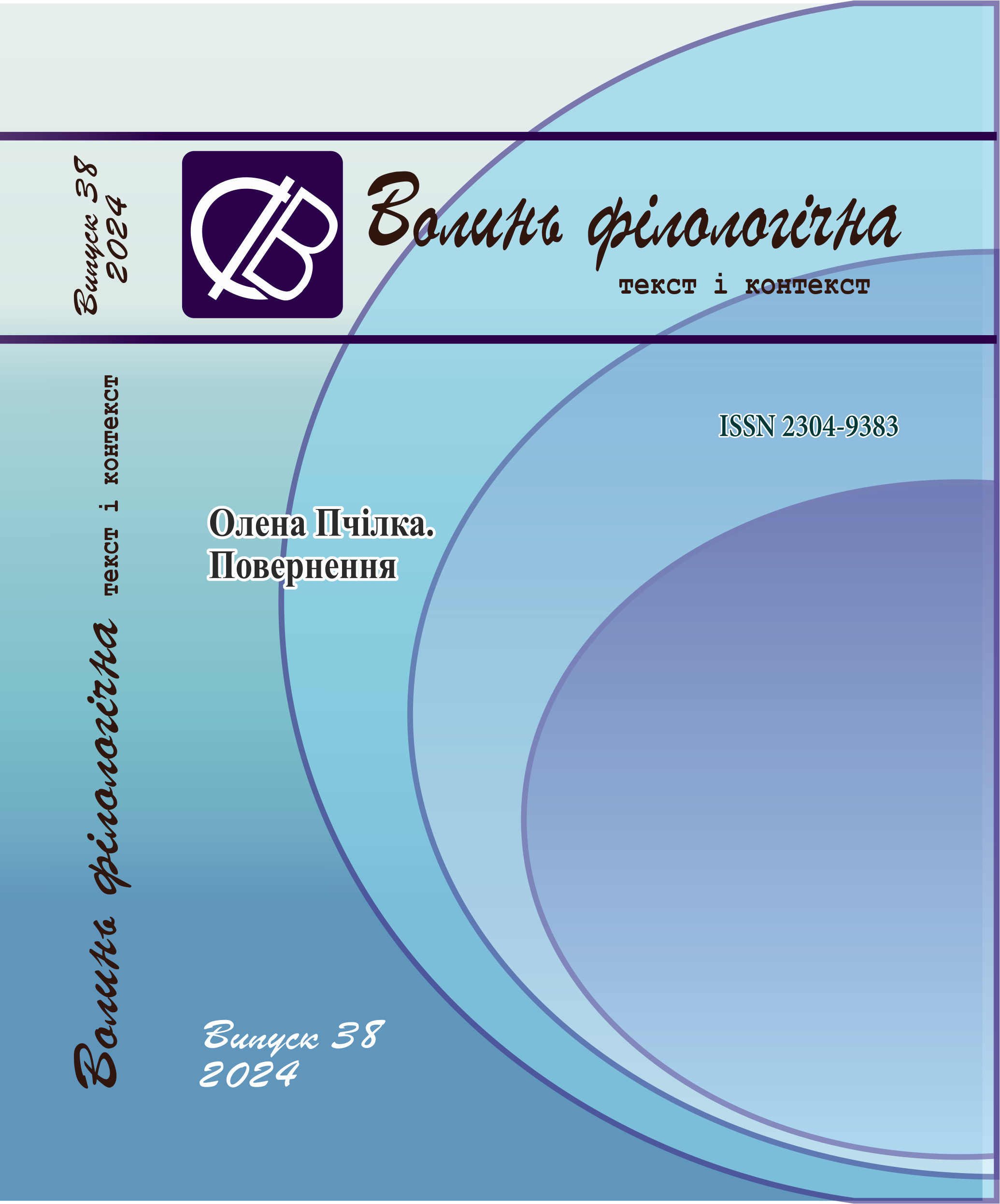Marking the Borderland in the Works of the PoetryGroup “Volyn
DOI:
https://doi.org/10.29038/2304-9383.2024-38.rybKeywords:
“Volyn text”, Ukrainian-Polish borderland, Poetry Group “Volyn”, geopoetics, small homeland, authenticism, catastrophismAbstract
The purpose of the article is to analyse the poetic heritage of the Poetry Group “Volyn”, which was active during the interwar period on the Ukrainian-Polish cultural border. Attention is paid to the geopoetic features of these works, their themes are outlined within the development of the ‘Volyn text’ as a borderland space. To achieve this purpose, the study uses the following methods: analysis and synthesis, comparative, biographical and intertextual.
Results. The article describes the artistic markers of the poetry of the authenticists, who aimed to preserve the national peculiarities of images and motifs, to record in detail the world on which their own experience was superimposed, to recreate the culture, historical heritage and landscapes of the Volyn land. Despite the fact that some of these artists lived in Volyn for only a few years, Volyn appears in their works as a phenomenon of a small homeland, which they recalled with longing in the later stages of their work, being far away from the land they loved and accepted as their own. On the other hand, some of the representatives of the Poetry Group “Volyn” were born and lived in the borderland for the rest of their short lives until the war cut the creative way of these poets. In their works, Volyn is the space that
contains the entire universe and at the same time is bequeathed as a starting point to the wider world they dreamed of. The third category of Polish poets who belonged to the group we studied are natives of Volyn, representatives of the borderland, who were forced to emigrate and whose works were influenced by new geopoetic spaces. Regarding this third category of poets, a logical question arises as to how far the “Volyn text” has been preserved in their figurative system, how it influenced the formation of their work in general.
Conclusions. The category of the cultural borderland, which we have conditionally defined as the Ukrainian-Polish borderland, contained the influences of a conglomerate of many nationalities that lived in the Volyn lands in the interwar period. By focusing on the catastrophic motifs that were largely manifested in the poetry of the representatives of the Poetry Group “Volyn” at the local and universal levels, the publication has managed to trace the worldview of the authors of the “Volyn text”.
In terms of methodology, the work contains innovative elements, since the works of Polish poets of the interwar period who lived and worked in Volyn were diverse, and the common denominator of the work of many authors was the system of images in their poems which despite the differences in authorial style contained identical or similar markings of local and universal reality, enclosed in the phenomenon of the borderland.
References
Греля-Кравченко, С. (2019). Юзеф Лободовський – митець, мислитель, бунтар та українофіл. Життя і творчість. Луцьк: Синя папка.
Оляндер, Л. (2008). Волинський текст в українській та польській літературах (XIX–XX). Луцьк: ВНУ ім. Лесі Українки.
Рибальченко, О. (2024). Катастрофічні мотиви у волинській польськомовній поезії періоду Міжвоєнного двадцятиліття. Київські полоністичні студії, 40, 508–523.
Antologia Poezji Grupy Poetyckiej “Wołyń” (2018). Cz. 1 / red. L.-W Szajdak. Poznań: ProDruk.
Antologia Poezji Grupy Poetyckiej “Wołyń” (2019). Cz. 2 / red. L.-W Szajdak ; przekł. O. Stadnyk. Poznań: ProDruk.
Ginczanka, Z. (2019). Collected Poems [Poezje zebrane (1931–1944)]. Warsaw: Marginesy.
Grupa poetycka «Wołyń» – geneza, przedstawiciele, wiersze (2023) / red. T. Skoczek. Warszawa: Wydawnictwo Muzeum Niepodległości.
Kraszewski, J.-I. (1985). Wspomnienia Wołynia, Polesia i Litwy. Warszawa: Ludowa Spółdzielnia Wydawnicza.
Mazur-Fedak, J. (2001). Jadwiga Sawicka, Wołyń poetycki w przestrzeni kresowej, Warszawa 1999: recenzja. Ruch Literacki, 1, 98-100.
Moskalowa, A. H. (1979). Autentyzm w polskiej poezji międzywojennej. Warszawa: Ludowa Spółdzielnia Wydawnicza.
Sawicka, J. (1999). Wołyń poetycki w przestrzeni kresowej. Warszawa: DiG.
Szajdak, L. W. (2014). Stefan Szajdak Wołynianin z wyboru [Stefan Szajdak Volyn resident by choice]. Monitor Wołyński, 17, 12–13.
Szajdak, S. (2021). “A jednak i to minęło”. Poeta Autentysta. Współzałożyciel Grupy Poetyckiej “Wołyń”. Środa Wielkopolska: ProDruk.
Szajdak, S. (2018). Close and closer [Blisko i bliżej]. Środa Wielkopolska: ProDruk.
Wiegandt, E. (2008). Kresy we współczesnych badaniach literackich. Prace Filologiczne. Seria Literaturoznawcza, 55, 77-90.
Wolski, J. (2007). Gwałtowny rytm zmieniających się obrazów: krajobrazy wołyńskie w poezji Wacława Iwaniuka. Збірник праць ТО НТШ, 3, 254–263.

